San Bernardino shooting: Who were the attackers?
- Published
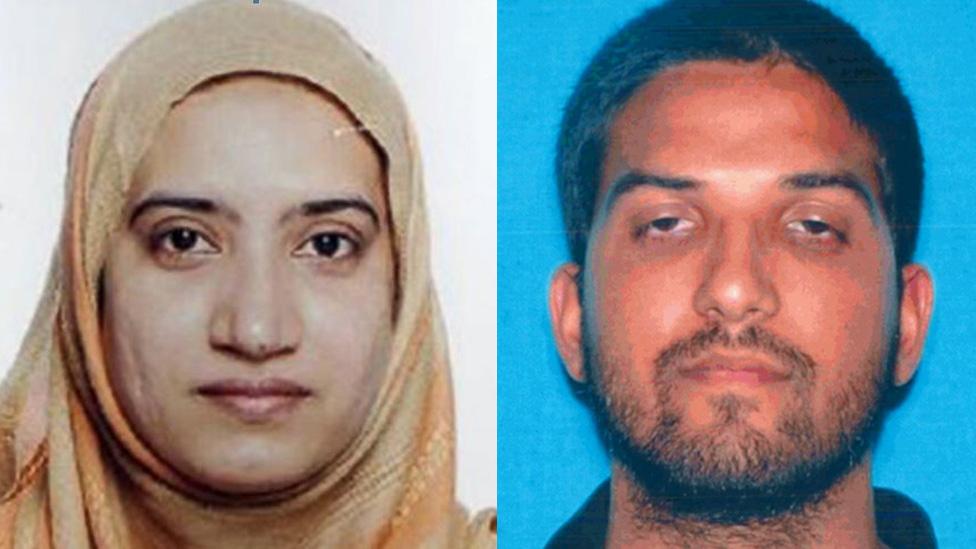
Tashfeen Malik and Syed Rizwan Farook
Investigators have not yet publicly revealed a motive in the deadly San Bernardino shooting in California on 2 December.
But US officials have said one of the two attackers, Tashfeen Malik, pledged allegiance to Islamic State on social media on the day of the shooting.
The other perpetrator, Syed Rizwan Farook, helped his wife Malik launch a deadly assault at a workplace event, killing 14 people
The discovery of pipe bombs at the scene and more bomb equipment as well as weapons and thousands of rounds of ammunition at their home suggests a degree of planning, investigators said.
So who were the attackers and what evidence is there that they may have been extremists?
Tashfeen Malik
Farook's wife, 29-year-old Tashfeen Malik, pledged allegiance to IS on social media, the day of the shooting, US officials have said.
But much of her life in the US remains a mystery, the Washington Post , externalreported. Days after the shootings, no-one has emerged as a friend - or even her acquaintance - in San Bernardino.
What is known about her is that she came from a prosperous Pakistani family that practised Sufism - a more liberal interpretation of Islam that is viewed with scorn by more radical followers of the faith.
Malik grew up in Saudi Arabia but in 2007 she returned to her ancestral homeland near Multan - in the Pakistani province of Punjab - to pursue a pharmacy degree at Bahauddin Zakariya University.
She was a hardworking student, according to friends - and never showed any signs of religious extremism.
"She was one of the top five students," Talal Shaheer, who studied studied pharmacy with Malik, told the BBC.
"She was social, she would talk to boys, she would participate in class activities... she was not a religious activist," he said.
Asked if she had spoken against the US, he said: "Never. Politics was not the topic of her choice. Her favourite topic was studies."
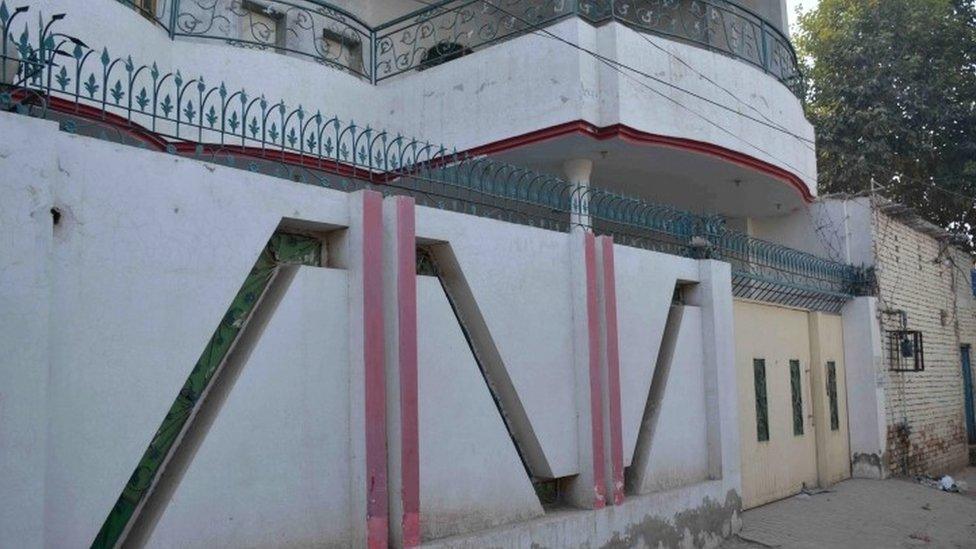
Tashfeen Malik is believed to have stayed at this house in Multan, Pakistan, while studying pharmacy at the Bahauddin Zakariya University
Another of her friends, Abida Rani, told the Washington Post that Malik changed around 2009, suddenly becoming more interested in Islamic studies than pharmacy.
Ms Rani told the paper that Malik would daily travel across Multan to a madrassa that was believed to be espousing the ultra-conservative Wahhabi branch of Islam - often cited as the ideology of Islamic extremists around the world.
The young student was reported to have declined being photographed at the end of her college life - believing it to be contrary to her new religious beliefs - and to have spoken Arabic much more frequently.
She is believed to have met Farook in Saudi Arabia during the Hajj pilgrimage of 2013, a source told the Associated Press news agency.
The FBI says Tashfeen Malik came to the US in July 2014 on a Pakistani passport with a fiance visa that required she get married within 90 days or leave the country.
The US government did not pick up on extremist messages posted online when Farook and his wife began chatting.
Farook and Malik talked about martyrdom and jihad as early as 2013, but they did not get on authorities' radars.
To get the visa, she had to submit to an in-person interview and biometric and background checks to ensure she was not a threat to public safety or national security, AP reported.
The couple were married in Riverside County in 2014 and celebrated the union at the Islamic Center in Riverside with a party for up to 300 people, Reuters reported.
David Chesley, a lawyer for the Farook family, on Friday said family members described Malik as "soft-spoken" and "like a typical housewife".
She did not drive, wore a burka and did not interact with male family members, Mr Chesley said.
Malik applied for permanent residency in September 2014 and received a permanent resident green card in July 2015 following further background checks by the FBI and Department of Homeland Security.
Syed Rizwan Farook
Syed Rizwan Farook was "living the American dream" and had "everything to be happy", people who knew him said.
The Chicago-born 28-year-old had a good salary, earning $71,230 (£47,500) in 2013 as an environmental health specialist for the San Bernardino County Department of Public Health, external and had just become a father.
He was a religious man, loved cars and also enjoyed shooting guns, according to a dating website profile believed to have belonged to him.
"Enjoy working on vintage and modern cars, read religios books, enjoy eating out sometimes travel and just hang out in back yard doing target pratice with younger sister and friends," the badly-spelled profile under the username "farooksyed49" said, according to the Guardian, external.
The profile on the Indian dating website Imilap.com, external - reportedly written about six years ago - is now shown as being "under review".
His co-workers at the health agency appeared to like him, AP reports, holding a baby shower before his daughter was born in which they collected cash for him and his bride.
Investigators are now examining the possibility he may have been radicalised.
His two sisters, Saira Khan and Eba Farook, told the New York Times, external they had no idea that Farook and his wife were preparing for the assault and that the pair seemed happy with their six-month-old baby.
A lawyer for the Farook family, Mohammad Abuershaid, said it was "in complete shock".
Mr Abuershaid said the family had little indication that Farook was unhappy at work.
But Mr Abuershaid said Farook had recently told family members that co-workers had mocked his beard.
The lawyer said the family knew that Farook owned two handguns and two rifles that were kept locked up.
However, the family said were unaware of the massive arsenal that the couple had amassed.
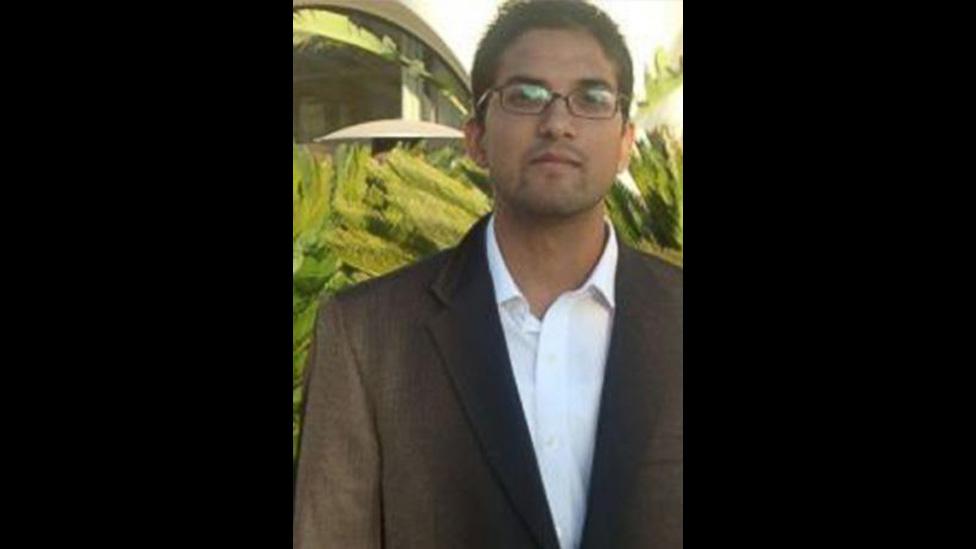
Syed Rizwan Farook is seen in profile photo from a dating website
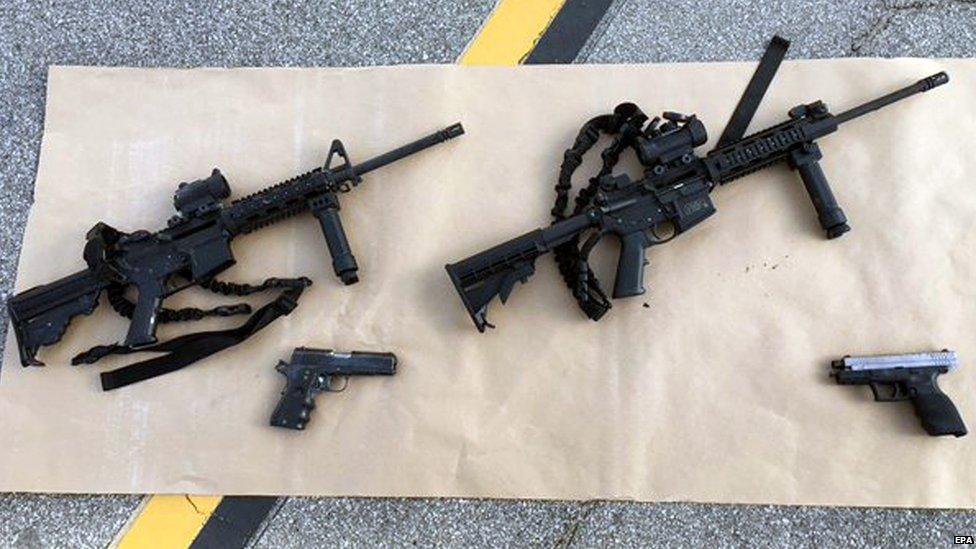
Officers recovered several semi-automatic weapons from the scene of the shooting
He had been in touch with people in the Los Angeles area who had expressed extremist views and had also been in contact with people overseas who were "of interest" to the US authorities, NBC reported, external, quoting intelligence sources.
Farook travelled to Saudi Arabia in 2013 during the annual Hajj pilgrimage to Mecca and returned to the country in July 2014, the LA Times reported, quoting a security source. There was no record of Farook having travelled to Pakistan - where his parents were born.
These trips did not attract the attention of the security services because they were short in duration and he did not travel to places where he could have spent a period of time in a jihadist training camp, a law enforcement official told the LA Times, external.
However, the newspaper reported that investigators were examining the possibility that pipe bombs attached to a remote-controlled device found at the scene of the shooting were based on a design found in Inspire magazine, an online publication run by Yemen-based Al Qaeda in the Arabian Peninsula.
Farook prayed every day at the Islamic Center of Riverside - but stopped abruptly three weeks ago.
The centre's director, Mustafa Kuko, said he had never shown any sign of holding extremist views.
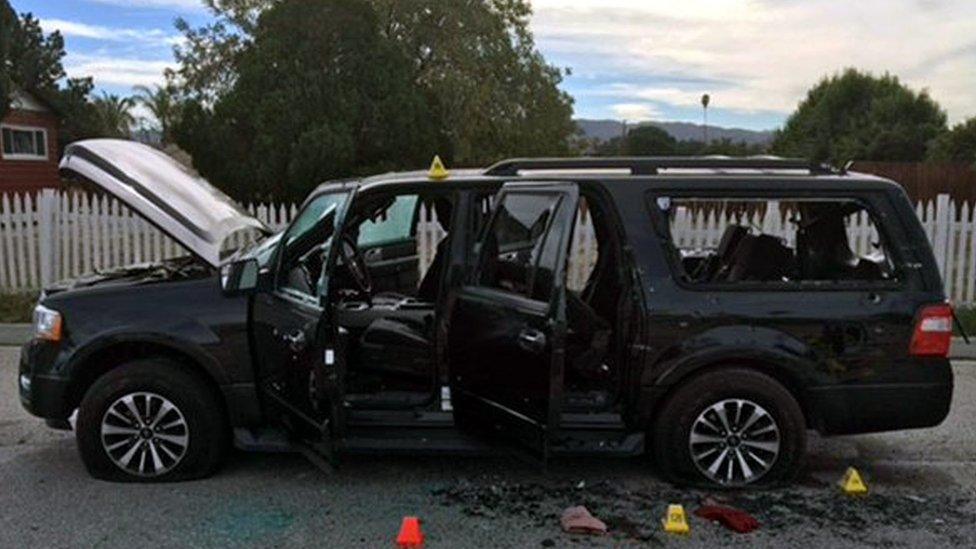
Syed Rizwan Farook and Tashfeen Malik were killed in a shootout with police
"He's a very committed person and he looked like a decent guy, looked very nice, cool-headed person, never gets into arguments with anyone, never gets into any disputes. He speaks with a soft and gentle voice. He is somewhat up to himself a little bit, not that social person," he told the BBC.
Mr Kuko insisted the Islamic centre emphasised "issues of moderation, a balanced life, issues away from fanaticism" in its sermons.
There were also some indications that Farook may have had an unstable family background.
Court filings in 2006 and 2008 showed that Farook's mother Rafia filed restraining orders against his father, also called Syed, describing him as a mentally ill alcoholic who was taking medication and "threatens to kill himself on a daily basis", the Guardian reported.

San Bernardino shooting - in depth
Jon Sopel reports
What makes this shooting different? - Multiple attackers, a woman involved, a well-planned attack, explosives and a fleeing attempt
'It's crazy they lived next door' - Neighbours tell the BBC of their shock that the attackers lived nearby
Politicians 'shamed' for offering prayers - Does prayer do anything in the wake of a shooting?
